I received the text and images below in an email from agbenjamin "at" gmail.com. I had no idea that the gentleman knows the truth about Abraham Lincoln, but was pleasantly surprised to see that he does.
The truth about Lincoln is even worse than I thought, that some of his generals and supporters were Marxists or communists, at a time when Marxism was a new political phenomenon.
Read and enjoy. --Stogie
********************************
HIS SNIPPETS SHOULD SIMPLY...BLOW THE MINDS OF READERS.
I never much liked history in high school because I chose to be ignorant about everything... Since those heady days, I decided to seek and find. And guess what I found?

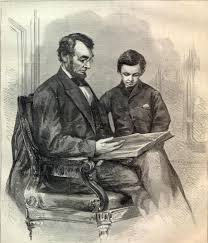 TEACH YOUR CHILDREN
TEACH YOUR CHILDREN
Allen Guelzo is the director of the Civil War studies department at Gettysburg College. He is the author of a magnificent new history of the Civil War and Reconstruction...He is one of thousands of fawning pot-smoking professors who fill the minds of your kids whose education cost you $100,000...and what follows is what you get for your money. I highlight for effect and the insertion of photos are mine. Note, the professor asserts at the beginning of his essay that his comments are not meant to be read as a movie review, but, Rather, Dan, as a historical one. And, as you can only read in SNIPPETS, the facts are always there for everyone to see... AGB
THE DAILY BEAST HISTORIAN GUSHES in liberal-left lingo and I highlight for a good reason as you shall see...
"Cumbersome and over-complicated as it is, Lincoln is still filled with a certain robust joy in the rough-and-tumble of American politics. In an age when so many people puffingly complain about gridlock, lobbying, campaign money, and inefficiency,Lincoln embraces all of them, and good comes out of it. It is, despite its over-length, a movie of confidence – confidence in politics, confidence in a very skilled yet principled politician, confidence in the self-created mazes of our representative democracy. And Day-Lewis’s Lincoln, haggard but smiling, tormented and yet fundamentally serene in his knowledge of doing right, carries even the slowest and most awkward moments toward a fundamental affirmation of truth and purpose.
The queue has grown longer even as I think about this. I want to tell them that Lincoln will be worth the wait, and worth the length. They are about to see what we so often deplore as mere sausage-making, and they will love it. They will see, in politics, how law and justice embrace. I step out into the chilly autumn evening, rejoicing."
AGB: especially note the words "TRUTH," "PRINCIPLED," and "LAW and JUSTICE."
http://www.thedailybeast.com/articles/2012/11/27/a-civil-war-professor-reviews-lincoln.html
You've seen the films...
Abe Lincoln: Vampire Hunter
Steven Spielberg's: LINCOLN

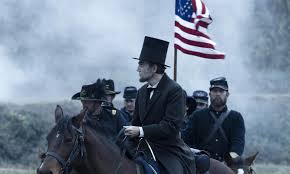

You've heard the myths...
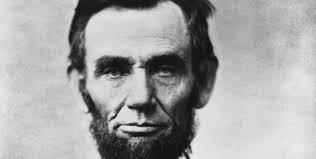
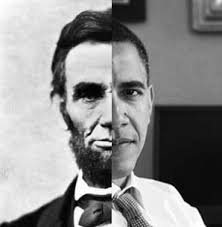
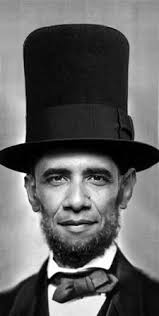 NEWS: The Civil War was not waged to free slaves.
NEWS: The Civil War was not waged to free slaves.
The Civil War was not waged to "save" the Union.
The Civil War was waged to impose centralized socialist (Federal) control and a centralized socialist economy on all the states; and to seat the nexus of power in the executive and a small group of elites. In order to achieve that end, the north required the disarming of the south and the destruction of the southern economy.
Since 1961 there has been a progressive effort to crush the intent of the US Constitution through placing seats on the Supreme Court, in the federal legislatures, and in the controlling interests of the states by transferring not just wealth, but power and ideas.

The nexus of socialist thinking: Communism and Socialism, was not within the Democratic Party of America in those heady days, but in the Republican Party.
That the two parties switched roles is but a late development AFTER the Civil Rights Act of 1964. (That same year the "idea" of Palestinian nationhood was born as well, as in, there is no such thing. The Palestinians, to make it short, are simply Jordanians and southern Syrians still fighting one another and the Jews for a SECOND Arab State called Palestine, as in the first Palestinian state is called and has been called Jordan. That fact is corroborated by their leadership).
Getting back to reality and the history that you had never learned in high school because the victor writes the history and the victims do not. From this story you may get a better understanding for where America is heading...
- AGB
COMMUNISTS’ EFFECT ON AMERICA
by Joan Hough
Their influence from then to now—How did it all begin? Did they leave their footprints on our nation?

Why did Lincoln and his Republicans insist on attacking the sovereign nation, the Confederate States of America? Why did Lincoln and his Republicans refuse to compromise with the South?
Perhaps the following may set you on the pathway to truth and aid you in answering both questions.
All that follows comes to us through the courtesy of Walter D. Kennedy and Al Benson, from their explosive, iconoclastic history text entitled RED REPUBLICANS AND LINCOLN’S MARXISTS: MARXISM IN THE CIVIL WAR (obtainable online at
http://www.iuniverse.com/bookstore/ ). If you think what you read here is something----“you ain’t seen nothin’ yet!” Do read the book. My impression of the contents in just one of its chapters follows.
IMPORTANT REPUBLICAN POLICY- INSTIGATORS, ‘”FRIENDS IN HIGH PLACES,” --APPOINTED THERE BY ABE LINCOLN --
1. Brigadier General Joseph WEYDEMEYER of Lincoln’s army was a close friend of Karl MARX and Fredrick Engels in the London Communist League. Marx wrote Weydemeyer’s letter of introduction to Charles A. DANA—an editor of New York Times Tribune. Weydemeyer was an escapist from the Socialist/Communist Revolution. He fled to the U.S. and became very active in the just-beginning Republican Party. He supported Freeman in the Republican Party’s first election and Lincoln in its second. He was described in a Communist publication as a “PIONEER AMERICAN MARXIST.’ He wrote for and edited several radical socialist journals in the U.S. (p. 200)
2. Assistant Secretary of War Charles A. DANA ---close friend of Marx, published with Joseph Weydemyer a number of Communist Journals and, also “The Communist Manifesto,” commissioned by Karl Marx. As a member of the Communist/Socialist Fourier Society in America, Dana was well acquainted with Marx and Marx’s colleague in Communism, Fredrick Engels. Dana, also, was a friend of all Marxists in Lincoln’s Republican Party, offering assistance to them almost upon their arrival on the American continent. This happened often after receiving introductory letters from Karl MARX, himself. (p. 196).
“Prior to the Bolshevik Revolution in Russia, no other American did more to promote the cause of communism in the United States than did Dana.” (p. 141). It was due to Dana’s close friendship and work with the New York Tribune editor, Horace Greeley, another dedicated socialist, that Greeley employed Marx as a correspondent/contributor to the U.S. newspaper. Dana became the first high-level communist in an American administration---which was the FIRST REPUBLICAN ADMINISTRATION in the United States of America.
3. Brigadier General Louis BLENKER, Lincoln’s army—radical socialist/Communist from Germany—was remarkably successful in encouraging German immigrants to join Lincoln’s army and the Republican party. He promised Lincoln that he could get “. . . thousands of Germans ready to fight for the preservation of the Union.”(p. xiv). He was a leader in the Revolution in Germany and fought in several battles there. When the Revolution failed, he went to Switzerland where, along with other Marxists, he was ordered to leave the country. His life in the U.S. was markedly grander than it had been previously—on a much higher social level. As a General, he offered a refuge to all Marxists. If unable to obtain a commission for them, he made a place for them as “aide-de-camp.” Great food, great drinks, great entertainment and servants were available for one and all obtained, largely by looting defenseless civilians. This practice was so flagrant, civilians who were looted, were considered “Blenkered.” Later, Blenker, under accusations of graft, resigned his commission. (p. 118)


THAT WAS THEN THIS IS NOW.....
4. Major General August WILLICH—often called “The Reddest of the Red ‘48ers” was a member of the London Communist League with Karl MARX and Fredrick ENGLES. (p. xiv) Before seeking refuge in the U.S. Willich was a personal acquaintance of Karl MARX. In fact, Marx referred to Willich as “A communist with a heart.” Willich was a Captain in the Prussian army when he met Karl Marx and became a Socialist/Communist. The Prussian Army court martialed Willich and kicked him out of the army. He, then, participated in the Socialist Revolution in Germany. He fled the nation when the revolt was crushed, and eventually wound up in the U.S. and became an editor of a newspaper in Cincinnati written in the German language. He raised volunteers from the Germans in his area and became their Captain. Eventually he became a general and was, actually, a competent commander. He never ceased indoctrinating his troops with the Socialism message. He did not like Lincoln’s ties with big business, but supported him, nevertheless. (p. 200) In Germany, he was involved with fellow radicals, Gustav Struve, Frederic Hecker, and Franz Siegel in presenting demands for the creation of a socialist government to the Frankfurt Parliament, and in Socialist Revolutionary efforts.
5. Major Robert ROSA, of Lincoln’s Army, was a proud member of the New York Communist Club. (p. xiv)
6. Colonel Richard HINTON, of Lincoln’s army was one of the Charterist Socialists who fled England. The British police raided several London places of known Chartist connections and discovered ammunition and weapons. Some Chartist followers were arrested and tried. Others made it to America where, as radical socialist/Communists they were supporters of Lincoln and involved in propaganda via writing for newspapers and other publications. Hinton was an associate of the terrorist, John Brown and after the war was a correspondent for a Boston newspaper. (p. 106)
7. Spy chief Allan PINKERTON, head of the Republican Ohio Department “spy service” under General George B. McClellan. Pinkerton was the most famous of the Charterists, a radical socialist group pursued by British agents. Pinkerton fled to the U.S., settled in Illinois where he became an operator of the Underground Railroad conveying escaped slaves to Canada. (Illinois citizens would not allow free blacks to live in their state.) Pinkerton was one of the big backers and among the financiers of John Brown and Brown’s fellow terrorists. Later Pinkerton served as Lincoln’s guard. Lincoln and Pinkerton became acquainted while Pinkerton was a detective for the Illinois Central Railroad, when Lincoln was its lawyer. It has been reported that Pinkerton’s inept intelligence gathering during the war was responsible for General McClellan always considering himself outnumbered by Confederates when he was not. (pp. 107-109)
8. Brigadier General Carl SCHURZ –as a young socialist, was noted for helping Gottfried Kinkel of Bonn escape from Spandau while imprisoned there for his socialist activities in the ’48 Revolts. Schurz came to America in 1848. He was a forty-eighter who became very active in the development of the Republican Party and in politics. He was given a high position by Lincoln in the Republican army. A great admirer of Karl Marx, Schurz was cognizant of Marx’s abrasive personality and made an effort to avoid imitation of that. He was an unsuccessful candidate for Lt. Governor in Wisconsin, and became a member of the Wisconsin bar in 1859. In 1860, he became he became a friend of Abraham Lincoln and a delegate to the Republican National Convention. Lincoln appointed him Minister to Spain in 1861. Schurz became a brigadier general in the Union Army in 1862, and was assigned to a command under John C. FREMONT and then under Franz SIEGEL. Schurz‘s Republican career continued under Rutherford B. Hayes who appointed him as Secretary of the Interior. It is believed that Schulz was a competent soldier. (p. 11). He, also, served as U.S. Senator from Missouri. (p. 198)

9. Brigadier General Alexander Von Schimmelfenning, like most of the other MARXISTS /Socialist/Communists who came to the U.S. after their failed uprising in 1848, fled Germany, and escaped retribution for his part in the attempted overthrow. Schimmelfenning’s history as a Socialist Revolutionary was no secret in Pittsburg when the Committee, headed by Republican J. Siebnick, recommended Schimmelfenning for Colonel of the new regiment of Pittsburgh German volunteers for Lincoln’s army. Schimmelfennig was well known in the German community because of a letter of his appearing in a well known socialist- abolitionist U.S. newspaper. Schimmelfennig recruited two former Prussian Army officers to help him recruit more Germans, especially Revolutionary Socialists. Schimmelfenning was effective as a commanding officer and became a brigadier general after Carl Schurz interceded for him by contacting the Pennsylvania congressional delegation which then lobbied Edwin M. Stanton and Stanton spoke to Lincoln. Schimmelfenning will always be remembered for hiding in a ditch under a makeshift culvert during the early part of the most pivotal battle of the war, the Battle of Gettysburg.
10. Major General Franz SIEGEL, thought to be one of Lincoln’s most controversial and the poorest of his generals, was deeply involved in the German 1848 revolts as a commander of socialist troops in the failed 1849 German Revolution. A graduate of the German Military Academy, he served in the German army and the Socialist efforts to overthrow the German government. For a brief period while the overthrow was temporarily successful, he served the new Germany as minister of war. After the fall of the revolutionary government, he fled to Switzerland and on to England, then to New York and on to St. Louis, Missouri, where he became the superintendent of the public school system. One might correctly say that when socialists gain power, “the three Rs become: Red, Radical and Revolution.” (work cited p. 112) Republican “…General Hallek stated: ‘It seems little better than murder to give important commands to men such as Siegel.’”(p. 113)
11. Commander Friedrich Karl Franz HECKER, (exact military title not known) known as “Red” and “Flagrant Friedrich.” (work cited, p. 113) Educated in Germany, received his doctor of law degree in Munich. He was expelled from Prussia. Arriving in the U.S., he took part in the creation of the Republican Party, encouraged the proliferation of German newspapers carrying the Socialist propaganda, aided in the election of Lincoln, and propagandized heavily among German immigrants for volunteers for the Republican Army. He was named Commander of a regiment he raised of Germans.
12. Captain Gustav von STRUVE was born in Germany to a woman of nobility and her Russian diplomat mate. Struve was one of the leaders, along with HECKER in the uprising in Germany in 1848. After the uprising Struve tried to succeed in a second uprising, but was arrested, found guilty of high treason, and awarded solitary confinement for five years, but was freed by fellow revolutionaries from prison, went to Switzerland where authorities there expelled him. After time in France and England, he arrived in New York with his radical wife. He became a Captain in Lincoln’s New York Infantry. Resigned his commission at the urging of Louis BLENKER and not long after, returned to Germany when a general amnesty became available.
13. General John C. FREMONT was noted for his close association with all of the socialist/communists whom Lincoln placed in positions of command in his army. Fremont was the first Republican candidate for president. He was considered to be the “darling” of the most radical socialists. His chief of staff, early in the war, was a Hungarian socialist revolutionary,
14. Chief of Staff (rank not identified) Alexander ASBOTH, Socialist revolutionary born in Hungary.
15. Brevet Major General Frederick Charles SALOMON, one of a group of four radical socialist brothers, with highly similar names-- three of whom were in the group of Socialist 1848ers. Frederick began his career in Lincoln’s army as a Captain in MO, wound up as a Colonel in the Ninth Wisconsin Volunteer Regiment, then a brigadier general and a brevet major general.
16. Brevetted Brigadier General Charles E. Salomon, also started his American military career with a bunch of MO volunteers. Born in Prussia, he, also, was one of the radical socialists arriving in the U.S. after the 1848 Socialist uprising failure and was a brother to Frederick Charles.
17. Governor Edward Salomon, a third Salomon brother, also born in Prussia, did not do military service, but ran for political office in Wisconsin, was elected lieutenant governor, becoming Governor of Wisconsin when the elected Governor drowned.
18. Sergeant Herman Salomon, the fourth Salomon brother, was markedly younger than the other three Salomon, but it is thought that he, besides sharing their surname, shared their family- devotion to Communism - not confirmed.
19. Colonel Fritz ANNEKE/ANNECKE was a Forty-eighter, with a strong leftward tilt. He was a Communist League member and a Baden Revolt veteran. He and wife, Mathilde Franziska Anneke, were a team of European communists. Fritz was a highly skilled artillery officer in the Prussian army where his equal skill as a socialist ideologue caused him to lose his commission and to be confined in jail. He was later tried and condemned to death “in contumaciam” for his leadership in the Baden rebellion. One of Anneke’s adjutants during that rebellion was Carl Schurz. Both of the Fritzs wrote for newspapers and journals. Both were strong abolitionists and supporters of Lincoln’s Union. Colonel Fritz received and then lost his U.S. military commission due to his difficult Prussian personality. He and his wife went their own separate ways later with his wife, Mathilde starting her own school for girls, continuing to preachy the glories of socialism, joining with Elizabeth Cady Stanton and Susan B. Anthony in their feminist cause—even lobbied in Washington D.C. for the feminist cause. She was a bird of the same feathers with that particular group of women because most of them were apostates from various division of the Christian religion, while she, a “free thinker” was a fallen away Catholic –converted to Communism by her husband Fritz Anneke.

20. General William Tecumseh SHERMAN. A list of “approved” socialist’ communists published by the press of the Communist Party of the United States included General Sherman’s name among other leading socialists/communists. “The editor of this communist book noted that Sherman was an “outstanding” general of the Union Army.” It should be noted that the co-founder of modern-day communism, Fredrick Engels, also saw Sherman as one of theirs. Both Gen. William Sherman and Sen. John Sherman, his brother, believed in a strong indivisible central government (p. 199) with every bit as much passion as did the announced Marxists and the still-in-the-closet Communists who, also, viewed it as a necessity for Communism (Marxism) to achieve its goal, so one can draw one’s own conclusions about the Shermans’ philosophy of government and of life.
[Although the Marxists added abolition as one of the new arrows for their bow, their true goal was not a humanitarian one, but to use slaves as a means of destroying the Christian South, which was resistant to their own religion---Communism.]
------------------------------------------------------------------------------------------------------
{The following is from William Tecumseh Sherman’s formal dispatches; see reference at end of quote.} “the Government of the United States has ….any and all rights which they choose to enforce in war—to take their lives, their homes, their lands, their everything….[W]ar is simply power unrestrained by Constitution . . . . To the persistent secessionist, why, death is mercy, and the quicker he or she is disposed of the better.” (p. 54). (William Sherman in official Records War of the Rebellion Vol. XXXII, pt. II, pp. 280-81].
p. 54: “There is a class of people [Southerners], men, women, and children, who must be killed or banished before you can hope for peace and order. (141; Sherman, ibid.)
http://dixieoutfitters.com/p/communist-s-effect-in-america
Obama's own Bill Ayres later doubled down on that thought when he suggested that 25 million Americans will need to be killed to achieve the socialist paradise.
See Ayres tell it in his own words in 1977 on YOU TUBE:
http://www.youtube.com/watch?v=XBtANp4IKVk
As you can see, it is the counter-revolution he was afraid of. That is the SAME counter-revolution that Obama has recently set up an organization to monitor. Oh yes, the first people to be murdered are Capitalists - especially the well-educated ones from Harvard, Yale and Columbia.
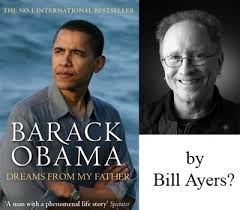



--
The Unbearable Lightness of Being Liberal
The details don't really matter. Only the image does. Or the image of the image. The melange of emotion and outrage, titillation and talking down to that exercise the reptilian brain leave nothing inside it. - Dan Greenfield
















